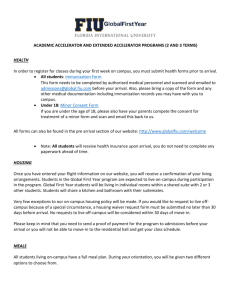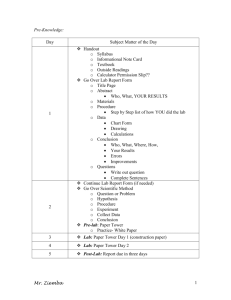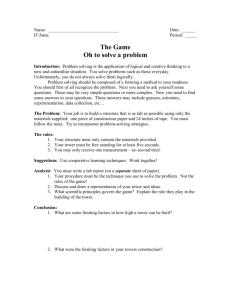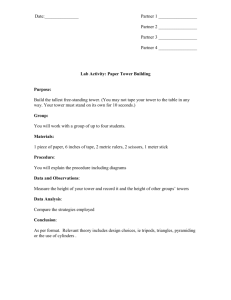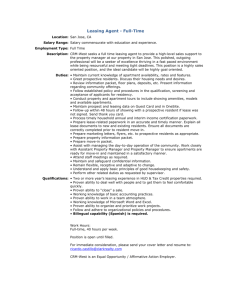ISE Integrated Systems Engineering Lean Six Sigma
advertisement
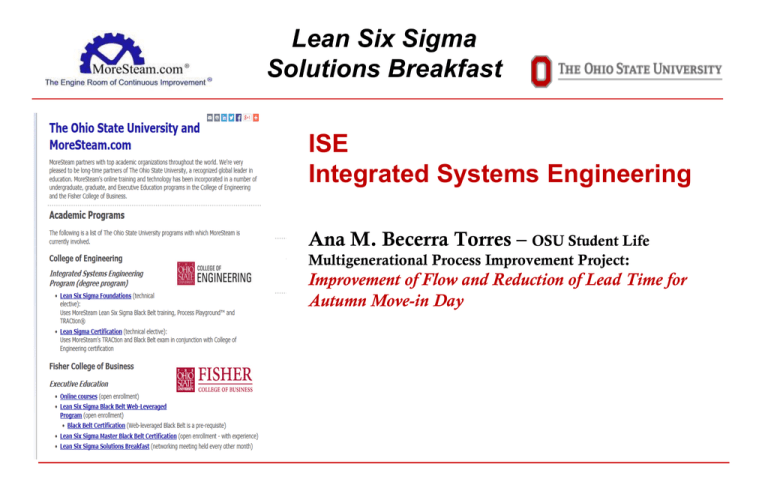
Lean Six Sigma Solutions Breakfast ISE Integrated Systems Engineering Ana M. Becerra Torres – OSU Student Life Multigenerational Process Improvement Project: Improvement of Flow and Reduction of Lead Time for Autumn Move-in Day ISE Integrated LeanSigma Capstone Certification Program Launched in 2007 Scott Sink leads the program (sink.22@osu.edu ) Trained over 270 ISE UG’s and G’s in the ILSS Black Belt Program 5 BB Certifications and ~ 150 GB Certifications 3 Semester program, 2 semester certification project Sponsor shown on next slide focus on change leadership and management, six sigma, lean… 14 week foundation course with 3 Saturday experiential labs/simulations Course design brought from Private Sector, best in class BB Blended Training Model (use Moresteam extensively) PROGRAM OUTCOMES: program demand (sponsors and students has quadrupled since 2007) Direct and Indirect Benefits (audited) $2.8M In-Flight Benefits $3.2 M 70% certification rate ISE Integrated LeanSigma Capstone Certification Program—2007-Present (current sponsors 11.03.2014 3 Queue Control & Management for The Ohio State Assisted MoveIn Process Ana M. Becerra Torres Project Leader Aubrie Smith Process Owner Daren Lehman Process Sponsor D. Scott Sink, Project Coach Ph.D., P.E. March 12, 2014 D M A I C About Me Background: I am from Bogotá, Colombia Major: Industrial & Systems Engineering Graduation : May 2014 Currently working for METTLER TOLEDO Lean Six Sigma Capstone Bogotá, Colombia The Ohio State University- Department of Student Life The Assisted Move-In Process Agenda • • • • • Project Overview Process Simulation Evaluation Results Schottensteing Center Takt Time Future Improvements Project Overview • Once a year the department of Student Life coordinates the Assisted Move-In Process (AMIP) • AIMP helps about 6,000 students move-in to the appropriate residence hall • AMIP is run by volunteers, either staff or Ohio Welcome Leaders (OWL) Problem Statement Problem Statement Not meeting customers lead time expectations due to the inefficiency of queue control and management at Schottenstein Center and residence hall’s holding lots Goal Improve flow, eliminate bottlenecks Reduce Lead Time Increase internal & external customer knowledge Eliminate second timers ENTRANCE TO THE SCHOTTENSTEIN CENTER Problem Statement VOC VOB Primary Customer: Parents Secondary Customer: Student Expected Lead Time under 1 HR Expected Lead time under 2 HRS OSU Department of Student Life is responsible for coordinating the assisted move-in process and providing a memorable experience for students on their fist day at the university. Customer Lead Time Expectations 24.4% 24.2% 25.0% 20.0% VOP Percentage 13.3% 15.0% 8.4% 10.0% 5.0% Some volunteers are familiar or have experience the process. 4.3% 2.2% 1.4% 0.4% 2:00 1:45 1:30 1:15 1:00 0:45 0:30 0:15 0.0% Expect Time (hr:mm) Data above was gather by Parent Move-In Satisfaction Survey given a day after move-in. Project Scope s c o p e Schottenstein Center Drackett Tower North Campus Morrill Tower West Campus Park Stradley South Campus • • Inside & outside • Schottenstein Center • Drackett Tower, Morrill Tower • Park-Stradley Hall Logistics & Transportation Three Residence Hall Areas ALMOST 33 RESIDENCE HALLS IN CAMPUS AREAS From Current to Future State 2012 2013 • 6 Control Points • VOC-waiting too long • Customers are familiar with process • Unpredictable arrivals • PS Holding Lots are unstable • 88% of customers lead time was under 2 hours • 8 Control Points • VOC – waiting too long • Customers have knowledge of the process –Don’t have waiting times • Predictable arrivals for 48% customers • No final decision makers for all control points • 98% of customers lead time was under 2 hours • 50% of customers lead time under 1 hours 2014 Define Measure •Problem Focus •Scope •Key Stakeholders •High Level Process Map •VOC-CTQCs •Voice of the process Analyze •Measure ment plan •Time Stamp data •Choke •Surveys point analysis •Queue theory •Takt time •Identify root causes to problems Improve Control •Simulation •Design future state improvement •Implement solutions •Sustain improved environment • 9 Control Points • Customers have knowledge how long each process takes on average • 100 % Predictable arrivals • Adequate staffing to keep cycle time at desirable level • 100% of customers lead time under 2 hours • 70% of customers lead time under 1 hour SCHOTT. CENTER Captured Data Unknown Data Swipe –In Arrival Distribution Entering Parking Lot Time Building Table Arrival Time Parking Lot # Time spent walking or taking the bus Exit Parking Lot Time Departing Time Schott. Center (Door) PARK-STRADLEY HALL Unknown Data Captured Data Exit Parking Lot Time Second Timers Swipe-In Arrival Distribution 18 Holding Lot Arrival Distributions Holding Lot Departure Distributions Unloading Zone Arrival Distributions Traveled Time to Holding Lot Unloading Zone Arrival Distributions 8 min Holding Time at Holding Lot Project Focus-Schottenstein Center Arrival of Demand 3 Main Choke Points 2014 Pain Point Arrival Demand 2013 Pain Point Holding Lots Inside Buildings Choke Points • Schedule demand based on systems capacity • Waiting time is not consistent-doesn’t follow holding lot Takt Time • Ideal Choke PointElevator System 2013 Smoother Arrival Distributions 2012 Move-In Ultimately Make arrivals to swipe-in stations to assimilate uniform distributions All 3 Buildings ParkStradley Hall Morrill Tower Drackett Tower 2013 Move-In 9% Lead Time Improvement for Drackett Tower, Morrill Tower, Park-Stradley 2013 Move-In % of Lead Times under 1 hours 2013 Move-In Lead Time Park-Stradley 1:00 71% 94% 30% 60 50 Frequency 2012 Move-In % of Lead Times under 2 hours 40 30 20 10 0 0:22 0:46 1:10 1:34 1:58 Led Time (hr:mm) 2:22 2:46 Lead Time Morril Tower 93% 1:00 98% 44% 60 50 Frequency Reduce the time it takes a customer to get from Building Table at the Schott. Center to being completely unloaded at the residence hall % of Lead Times under 2 hours 40 30 20 10 0 0:22 0:46 1:10 1:34 1:58 Lead Time (hr:mm) 2:22 2:46 Lead Time Drackett Tower 100% 1:00 100% 77% 60 50 Frequency Ultimately 40 30 20 10 0 0:22 0:46 1:10 1:34 1:58 Lead Time (hr:mm) 2:22 2:46 Following Takt Time To Meet Demand at Schottenstein Center # Computers Swiping 1 8AM-3PM Demand 6,000 2 3 4 MT 597 students in 7 hours PS 687 students in 7 hours 5 DT 6 Takt Time = 26.6 sec/stud per computer 456 students in 7 hours # Volunteers 2 3 4 5 6 7 8 9 10 min/student 1.4 2.1 2.8 3.5 4.2 4.9 5.6 6.3 7.0 # Volunteers 2 3 4 5 6 7 8 9 10 min/student 1.2 1.8 2.4 3.1 3.7 4.3 4.9 5.5 6.1 # Volunteers 2 3 4 5 6 7 8 9 10 min/student 1.8 2.8 3.7 4.6 5.5 6.45 7.4 8.3 9.2 Improvements Online Reservation • For all students attending AMIP Visible waiting Holding lots time functionality requirements • If there is a queue, then there will be an avg. wait time • Takt time • Constant waiting times OSU Move-In App • Create more transperancy of the process • Electronic data collection Training packets for OWLs and Volunteers • Roles and Responsibilities Questions
